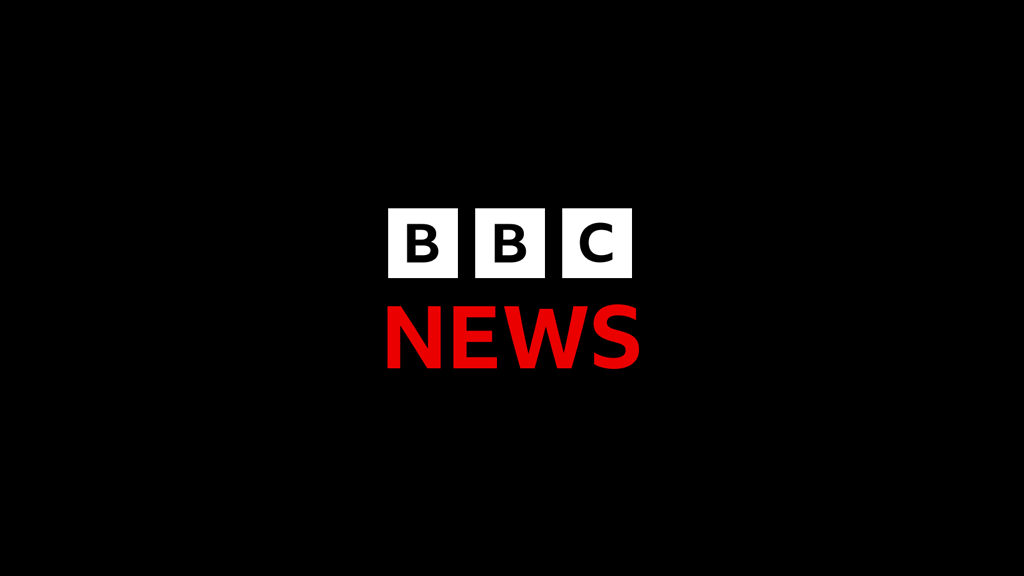Anger turns on Azerbaijanpublished at 08:05 Greenwich Mean Time
Esme Stallard
Climate reporter at COP29, Baku
“We have got a COP president that doesn’t engage parties and is fumbling in the dark,” said Mohamed Adow, who is the director of climate and energy think-tank Power Shift Africa at a press conference this morning.
Adow is one of many independent observers that sits in on the talks and his words echo what we have been hearing from other delegates in anonymous briefings this morning.
The role of the COP president – which this year is Azerbaijan’s environment minister Mukhtar Babeyev – is to bring the different countries together to negotiate but some feel he hasn’t been doing his job.
The proof will be in the… texts.
Let’s wait and see.

We’re into the end game here in Bakupublished at 07:54 Greenwich Mean Time
Justin Rowlatt
Climate editor, in Baku
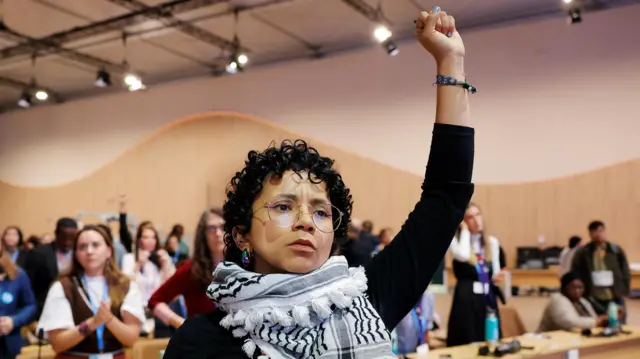 Image source, Reuters
Image source, Reuters
An activist gestures during the ‘People’s Plenary’ at the summit
This conference is supposed to close later today.
But deep divisions remain – and anger too.
Developing nations say rich countries must pay more.
Trillions not billions, is the phrase they use.
Rich nations say any cash must be met with commitments to cut emissions.
But yesterday Saudi Arabia said it would reject any text that targets fossil fuels.
It sounds like deadlock, but these negotiations are like a giant poker game.
Most players will only reveal the cards they are actually holding at the last moment.
Fury at climate talks over ‘backsliding’ on fossil fuelspublished at 07:41 Greenwich Mean Time
BBC Climate team
at COP29 in Baku
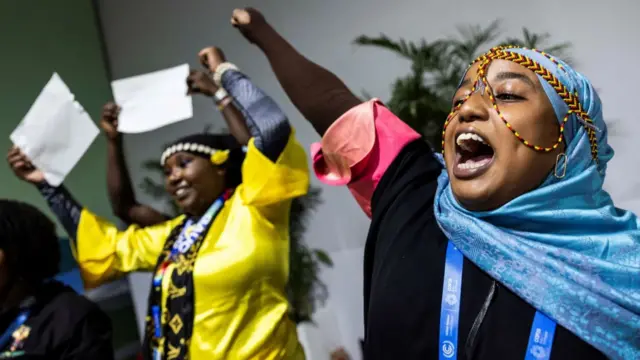 Image source, Reuters
Image source, Reuters
A row broke out yesterday at these climate talks as leading countries said a draft deal risked going back on a historic agreement to reduce the use of planet-warming fossil fuels.
Quote Message
Standing still is retreat and the world will rightly judge us very harshly if this is the outcome.”
UK Energy Minister Ed Miliband.
The UK, European Union, New Zealand and Ireland said the proposed agreement was “unacceptable”.
Developing nations are unhappy that a pot of money has not been agreed to help them tackle climate change.
The row comes as the UN Secretary General Antonio Guterres warned countries that “failure is not an option”.
We’ll be hearing more from countries soon after the revised text is released at midday here (8am GMT).

World way off target in tackling climate change – UNpublished at 07:32 Greenwich Mean Time
Matt McGrath
Environment correspondent
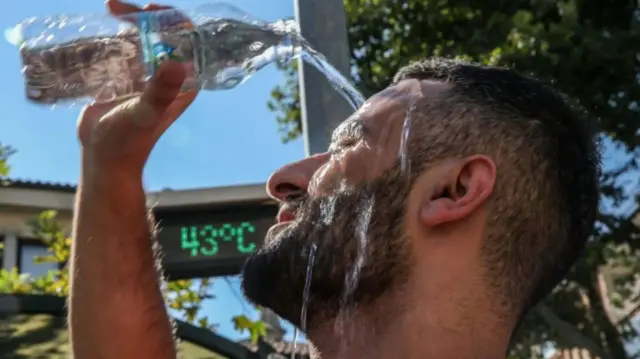 Image source, Getty Images
Image source, Getty Images
Little progress has been made in limiting emissions of greenhouse gases that are driving up temperatures
Global efforts to tackle climate change are wildly off track, the UN has said, as new data shows that warming gases are accumulating faster than at any time in human existence.
Current national plans to limit carbon emissions would barely cut pollution by 2030, the UN analysis shows, leaving efforts to keep warming under 1.5C this century in tatters.
The update comes as a separate report shows that greenhouse gases have risen by over 11% in the last two decades, with atmospheric concentrations surging in 2023.
Researchers are also worried that forests are losing their ability to soak up carbon, which could be contributing to record levels of warming gas in the atmosphere.
All eyes will be on the new text at midday in Bakupublished at 07:15 Greenwich Mean Time
Jack Burgess
Live page editor
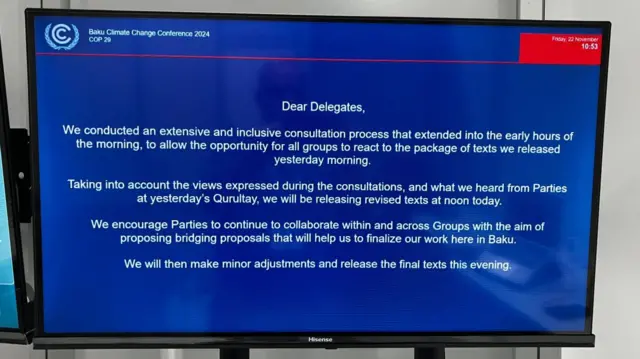
We’ve just seen this message appear on our screens in the COP29 conference centre.
It says that “taking into account the views expressed during the consultations” a revised text will be released at noon today local time (that’s 08:00 GMT).
A row broke out earlier at COP29 as leading countries said a draft deal risked going back on a historic agreement to reduce the use of planet-warming fossil fuels.
We’ll be looking through all the details in the revised text then.
The story so far in Baku…published at 06:57 Greenwich Mean Time
Esme Stallard
Climate reporter at COP29, Baku
It is hard to believe COP29 is already nearly over. Yet still there is so much to be agreed.
Although this has been called a “finance COP” countries are actually discussing lots of different issues relating to climate change:
- How much money to give developing countries to move away from fossil fuels and prepare for climate change
- What further commitments can be made to use fewer fossil fuels – the driver of rising temperatures
- What more support can be given to women who face a disproportionate burden from a warming world
- How they measure progress on their efforts to reduce emissions long term
Since last week developing countries have been calling for $1.3tn (£1.03tn) and that a significant share of this is in the form of grants rather than loans which can increase their debt burden.
But developed nations have been vague about what figure they would be willing to put forward.
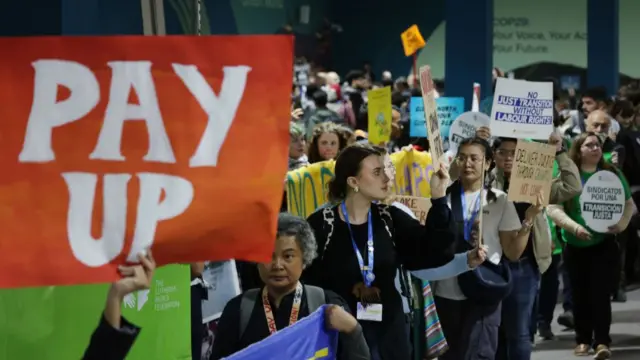 Image source, Getty Images
Image source, Getty Images
Activists have been making their voices hearing in Baku’s conference centre
What richer countries have been telling journalists over the last few days is their focus is to get stronger pledges on fossil fuels. Last year in Dubai at COP28 countries agreed to “transition away from fossil fuels” but currently in the texts we have seen there is no mention of this commitment at all.
Based on comments made by Saudi Arabia on Thursday it seems maybe they are holding things up on this.
Saudi Arabi’s Albara Tawfiq said: “The Arab group will not accept any text that targets specific sectors, including fossil fuels.”

Forget climate, COP is really about cashpublished at 06:42 Greenwich Mean Time
Justin Rowlatt
Climate editor, in Baku
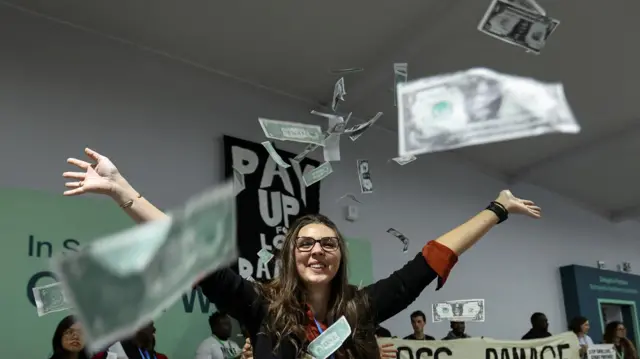 Image source, Reuters
Image source, Reuters
Environmental activists performing a protest at COP29
That was clear right from the start. The COP process began back in 1992 – that’s also when the arguments about who owes what to whom began.
Poorer countries said to the rich, developed nations: “you built your wealth burning fossil fuels; you should pay to solve the problem of climate change”.
Back then it was an onerous task – wind turbines and solar panels were expensive and inefficient and didn’t have the explosive power of fossil fuels.
The squabbles over cash have continued ever since.
It was only in 2015 at COP21 in Paris that all the countries in the process – rich and poor alike – finally agreed they would do their bit to tackle climate change.
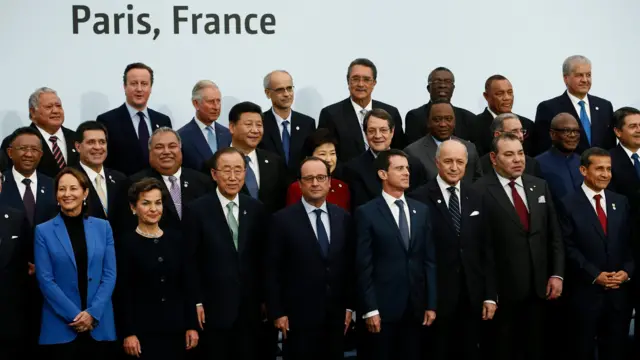 Image source, EPA
Image source, EPA
The Paris Agreement at COP21 saw almost all the world’s nations – for the first time – agree to cut the greenhouse gas emissions which cause global warming
The reward? Developed countries said they’d pay $100 billion (£79bn) a year to help poorer nations tackle climate change.
They also said that was just the first downpayment – they’d cough up significantly more in 10 years’ time.
Spin forward nine years and we get to Baku in 2024.
You could be forgiven for thinking that all that has changed is the scale of the cash on the table – up from $100bn (£79bn) to over a trillion.
But the economics of clean energy have transformed.
In many countries renewable tech now provides the cheapest energy in the history of humanity and the expectation now is the bulk of the cash the developing world is demanding will come from private investors.
It means the transition away from fossil fuels won’t be driven primarily by moral or environmental concerns anymore, but something much more powerful – the desire for private profit.
Let’s start from scratch… what is COP?published at 06:32 Greenwich Mean Time
Matt McGrath and Georgina Rannard
BBC News Climate and Science
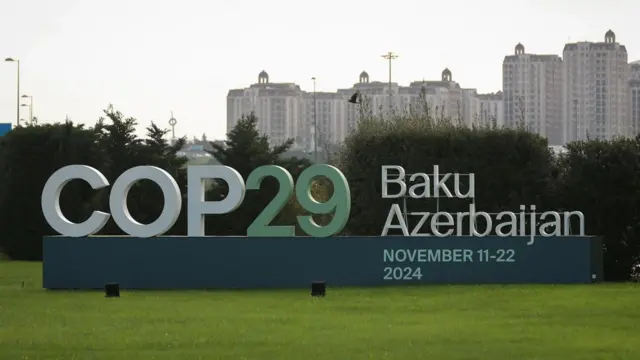 Image source, Reuters
Image source, Reuters
COP29 is the world’s most important meeting on climate change.
It is led by the UN, and the 2024 event, is the 29th such gathering. It has been running for the last two weeks – and is due to end today.
Every year it is rotated around a different region of the world. This year it is being held in Baku, the capital of Azerbaijan, a central Asian country located between Russia and Iran.
COP stands for “Conference of the Parties”.
“Parties” refers to the nearly 200 countries that have ratified a treaty called the UNFCCC (United Nations Framework Convention on Climate Change).
More than 50,000 delegates are believed to have been in attendance at COP29.
Climate talks at COP29 in Baku enter tense final stretchpublished at 06:29 Greenwich Mean Time
Jack Burgess
Live page editor
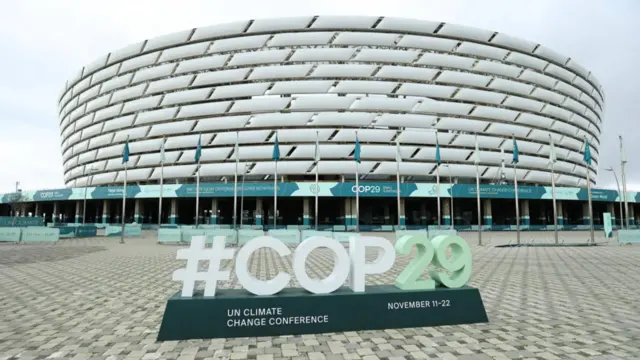 Image source, Reuters
Image source, Reuters
It’s just gone 10am (06:00 GMT) here in Azerbaijan’s capital Baku and I’m in a room at the heart of this year’s UN climate summit with the BBC’s climate and science team.
Nearly 200 countries have been locked in tense negotiations for two weeks.
They have been discussing how to reduce emissions and move away from fossil fuels, and crucially agree how much money developing nations will get to tackle and prepare for climate change.
A new draft agreement on finance is expected at about midday local time but there’s been a lot of frustration at the slow progress of talks since the conference started last week.
Today is scheduled to be the final day of the summit, so time is running out for nations to reach a deal.
COP is notorious for running into overtime and many here now expect talks to carry on into the weekend.
We’ll keep you up-to-date right here with the latest developments.
